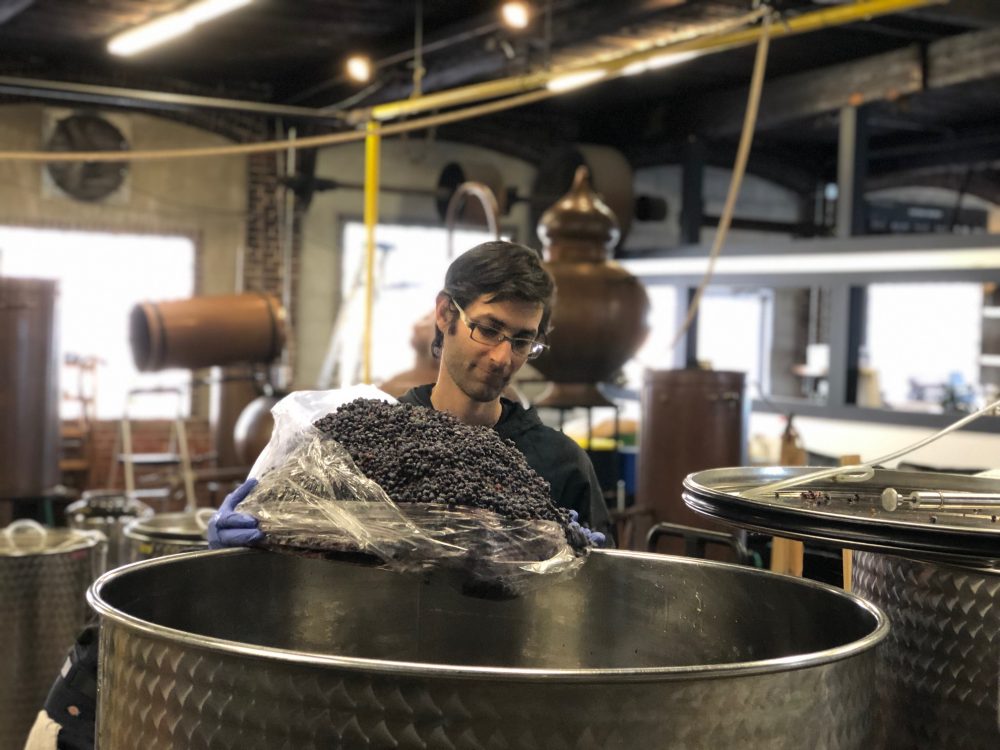Pictured: Zachary Robinson
“We could be paying tens of thousands of dollars in excise tax on hand sanitizer.”
Deserving or not, Massachusetts has a reputation for uptightness when it comes to laws regulating spirits and their consumption.
Now, amid the economic fallout out from COVID-19, the Massachusetts Distillers Alliance (MDA), which represents 14 distillers across the Bay State, is circulating a petition asking state officials to consider three measures that could give the industry “a fighting chance”: excise tax relief for the alcohol used to make hand sanitizer; the ability to sell and ship products directly to consumers within the state; and the ability for bars and restaurants to sell cocktails with takeout food orders.
According to some of the MDA board members who I spoke with, the petition isn’t calling for special favors—it’s about fairness and receiving the same considerations that other industries, particularly wine and beer, have received locally.
“Distilled spirits are regulated far more than any other alcoholic beverage, especially in Massachusetts,” Zachary Robinson, owner/distiller at Everett’s Short Path Distillery, said in an interview. “This was true before the pandemic, and it’s still true today. We’re trying to play by the same rules as beer and wine.”
The first measure concerns excise taxes on alcohol, which distillers must pay to the federal and state government. Because the alcohol used to make hand sanitizer is denatured—meaning it is made unpalatable—the federal government no longer considers it a beverage and does not require excise taxes to be paid on the final product. However, the Massachusetts ABCC (Alcoholic Beverages Control Commission) has given no indication on whether or not it will seek to collect excise taxes on the alcohol used to make hand sanitizer, leaving local distillers in the dark when it comes to their future tax bill.
“We’re just looking for clarity… we don’t want the state to come back in two months and say, ‘You owe us $20,000 in tax,’” Robinson said, adding, “If they do come back and say, ‘You owe us on that,’ at least we know.”
Compounding this frustration is the fact that many local distillers donated the hand sanitizer they produced to first responders and community organizations amid critical shortages of the product. Robinson recounts that Short Path alone donated hundreds of gallons of hand sanitizer to area homeless shelters, hospitals, and the Everett Fire Department—and may be charged dearly for it.
“We could be paying tens of thousands of dollars in excise tax on hand sanitizer,” Robinson said.
The second measure, which asks that distillers be allowed to sell their product directly to consumers, has already been implemented by states including Kentucky and Virginia in the wake of the pandemic. Robinson notes that this would put Massachusetts distillers on the same footing as wineries and breweries in the state (the Commonwealth already allows the direct shipment of wine and beer) and help make up for losses sustained from the closure of restaurants, bars, and distillery tasting rooms.
“We’re not asking for anything special here, we just want to be able to do exactly what beer and wine can do,” Robinson said. “All of the breweries and wineries in the state can still in theory sell to all of their accounts, but distilleries have lost half of their accounts. We can’t sell to bars and restaurants anymore. They’re not buying because they can’t sell it.”
According to Matthew Nuernberger, president of Boston’s GrandTen Distilling, direct-to-consumer sales are needed now that the rules of social distancing have seriously disrupted how craft distillers market their products.
“If you think about craft spirits, it’s very much a hand-sell item,” Nuernberger said. “We have people out working under normal circumstances … we have spirit tastings, introducing consumers to craft spirits, [employees] talking to liquor store owners about why they should carry craft spirits and why they should carry local Massachusetts brands. Given our current time, when high-touch is the opposite of everything we’re supposed to be doing, our channel to the consumer has totally dried up.”
The petition’s final measure is also a plea for parity. On April 3, Governor Charlie Baker signed a law allowing bars and restaurants to sell wine and beer with takeout food. But cocktails—which restaurants and bars in California and New York have been allowed to sell as takeout items—were notably absent.
“Wine and beer are safe, and spirits are dangerous—[that] is the message that the Massachusetts government seems to be sending out,” Nuernberger added when asked about the exclusion of cocktails. “The restaurant association says, ‘Hey, we can easily service alcohol and alcohol is an important revenue stream for us, but we’re not able to do it,’ and the Massachusetts government says, ‘We have a solution for that, we’ll simply allow you to still sell wine and beer.’ But there’s no mechanism for you to sell spirits.
“It kind of feels like we’re an afterthought, or not even a thought at all, to the state government.”
Aside from signing the petition, Robinson recommended that local drinkers reach out to their state representatives and senators to express their support for the petition’s measures, which are just one way to ensure a more even playing field for craft distillers in the state.
“The pandemic has highlighted [the need] to gain parity with other alcohol producers and have us all play by the same rules,” Robinson said.











